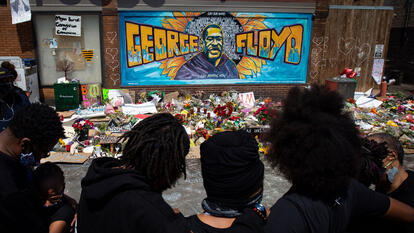
How a Summer of Protests Is Changing the Ways We Commemorate U.S. History, Including the Fourth of July
As a growing number of Americans are demanding a broad reexamination of how we acknowledge our national history, many are confronting their assumptions surrounding how we celebrate it, both in public spaces and on holidays such as the Fourth of July.
Here, Erich Hatala Matthes, associate professor of philosophy at Wellesley, and Jennifer Chudy, Knafel Assistant Professor of Social Sciences, discuss the calls for renewed discussions of U.S. history, what’s missing from our typical understanding of the Fourth of July, and the push for removal of Confederate statues across the country.
Some people claim that in the process of removing Confederate statues and renaming landmarks that honor enslavers and racists, history is erased. What would you say to Americans who share this view?
Erich Hatala Matthes: On the contrary, activism surrounding public monuments is a way of engaging with history, not erasing it. These activists are asking us to reflect critically on our country’s legacies of racism and oppression. Those are historical facts, and nothing that we do with monuments erases them.
Now, on the other hand, some people claim that these monuments are part of our heritage. That’s true, but not in a good way. Although we often use the term “heritage” as a celebratory label for things we value about the past, heritage can also be a way of embracing or disowning historical injustice by viewing the past through rose-colored glasses. People defend flying the Confederate battle flag with the slogan “heritage, not hate” as if calling it heritage means it must be something good, but that's an overly narrow view of heritage.
“The Fourth of July is a holiday that celebrates liberty, but we all know that the Declaration’s claims of equality . . . were not actually made with all people in mind. So, I think the best way we can celebrate those values is by trying to realize them.”
Erich Hatala Matthes, associate professor of philosophy
So if the worry is that we’re erasing a heritage that embraces antebellum nativism, then yes, but that’s a heritage we should reject. Heritage scholars typically recognize that heritage is as much about the present and the future as it is about the past: It’s about how the past is used for contemporary purposes.
When it comes to Confederate monuments, we know that many of them were erected during Reconstruction and the civil rights movement. Those who opposed the liberty of formerly enslaved people and the granting of civil rights were constructing a heritage that used figures who fought for the Confederacy as emblems for their cause. Rethinking these monuments can be a first step in opposing that legacy.
How do you interpret state and local government responses to protesters’ demands that statues be removed? Does this demonstrate a kind of progress or a reckoning with racist historical figures and the celebration of them in the public sphere?
Jennifer Chudy: It is difficult to assess government motivations for removing Confederate symbols. After all, many government entities have stringent laws to preserve the statues. For example, in 2017, Alabama passed a law prohibiting “the relocation, removal, alteration, renaming, or other disturbance of monuments located on public property which have been in place for 20 or more years,” including many Confederate statues and memorials.
And of course, many state and local governments permitted these monuments to be erected and displayed in the first place. So there is a precedent, at least in some localities, to explicitly legitimize these objects and what they represent. Even as these statues get removed, it’s important to remember the broader context: Government facilitated their creation and maintenance in the first place.
What does it mean when other governments take a different approach and remove the statues? For some, removing these symbols of white supremacy may reflect a genuine commitment to eradicating racial injustice; they may see this as part of a broader plan to address systemic inequalities across every imaginable domain of social life. Other governments will do this just to preempt social unrest. And still others will do it to distance themselves from shameful reminders of America’s racist past, but then will do little else to enact change. For these reasons, it is hard to interpret government action in this domain.
Typically, we view the Fourth of July as a celebration of the founding of our nation. Is something missing from that narrative? How can we rethink the way we observe the day?
Matthes: The Fourth of July is a holiday that celebrates liberty, but we all know that the Declaration’s claim of equality, its claims of life, liberty, and the pursuit of happiness for all, were not actually made with all people in mind. So, I think the best way we can celebrate those values is by trying to realize them. This country is rife with inequality. Our founders may not have lived up to their professed values, but we’re not exactly living up to them either.
If your approach to the Fourth is about grilling, well, OK, that’s not really celebrating the holiday per se, but using it as an occasion to relax. That’s fine. But if you really think of the Fourth as a commemoration of our freedom and you’re super-patriotic about it, I’d suggest taking a look around and seeing what you can do to help make freedom a reality for all.
Chudy: I hope Frederick Douglass’ speech “What to the Slave Is the Fourth of July” gets special attention this year. In this brilliant oratory, delivered in 1852, Douglass observed that the holiday “is yours, not mine. You may rejoice, I must mourn,” for the Fourth of July revealed to him “more than all other days in the year, the gross injustice and cruelty to which [the slave] is the constant victim.”
I often like to assign older texts in my classes because, in reading them, students can find striking application to contemporary political situations. This year, we might all consider the many thoughtful, and still relevant, observations offered by Douglass. It is a day to reflect on the enduring promise and hypocrisy of the American experiment.


